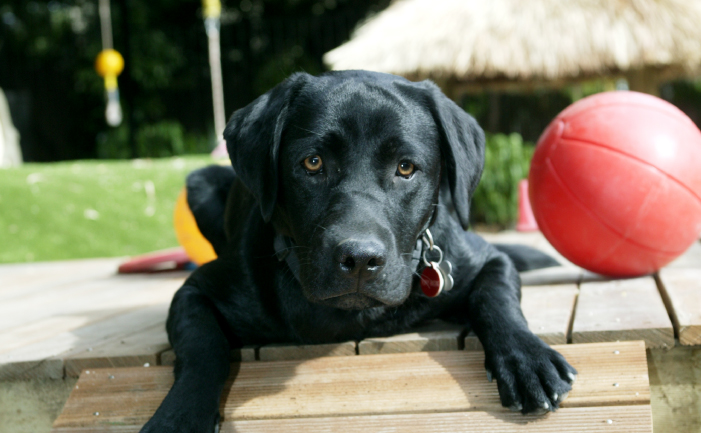Breed: Labrador Retriever
Temperament: loyal, fun loving
Lifespan: 12 years
Recommended for: families and couples
Popularity: Australia’s most popular dog breed (ANKC 1999)
Dumpage rate: low
Maintenance: low
Appearance
Labrador Retrievers are compact, robust, strongly built dogs with a dense water resistant coat and thick undercoat. They come in black, yellow, which is a mutation of the black and a rarer chocolate brown. Male labradors stand 56-57cm (22″) and bitches stand 54-56cm (21″). They weigh about 25-34 kg (55-75lb).
History
Labradors are from New Foundland but because there was already a breed called Newfoundland, another name was selected. They were originally known as St John Dogs or the Lesser New Foundland. Labrador is a peninsular in north-eastern North America between Hudson Bay, the Atlantic and the Gulf of St. Lawrence. It contains the Canadian provinces of Newfoundland and Quebec. Labradors were developed to aid fishermen towing in nets and working in the snow and ice of the near Arctic conditions. The dogs were taken to the north of England where they were used a gun dogs and retrievers.
Labrador Temperament
The Labrador Retriever is the most popular dog breed in Australia (ANKC registration figures – 1999) and is described as an ever faithful companion. Labradors are adaptable, friendly and loving dogs. They are also intelligent and obedient and can be trained easily and are employed as guide, service and customs dogs. Vets report that some strains of Labradors have been known to bite and that an increasing number of these have been put down because of this. We recommend checking the temperament of both parents before choosing a puppy.
Health and lifespan
Labrador Retrievers have three main health problems to watch for: Elbow dysplasia which is a degenerative disease of the elbow joints. Hip dysplasia which is a degenerative disease of the hips. Over-eating which can lead to obesity and this can cause problems with the joints.
Elbow and hip dysplasia problems can be avoided by buying dogs from parents that have been x-rayed and cleared of these conditions. Over eating can be controlled by maintaining a strict diet and giving your Labrador plenty of regular exercise.
Feeding
Labradors are known to be greedy eaters so breeders recommend feeding them a balanced diet of good quality dry food, vegetables and cheese or yoghurt. It is advisable to feed them no more than 0.75kg daily. It would cost about $10 – $20 a week to feed a Labrador.
Breeding and cost
Labrador Retrievers have few whelping problems and have a litter of 7 to 8 puppies. Puppies cost around $550 to $650 and there are often waiting lists for puppies.
Housepet Potential
When Labrador Retrievers are trained they are excellent in the house because they are obedient. But they need to know what is expected of them and they can be clumsy in the house, knocking things off low tables with their tails but if they are trained to go straight to their beds when they enter the house, problems can be minimised.
Space and exercise
Labrador Retrievers need a lot of exercise and should be walked for at least 20 minutes per day. If they are not exercised regularly they can become mischievous and overweight.
Ideal Owner
The ideal owner for a Labrador Retriever is a family because they like to be part of the activities. They are versatile animals and are also good with elderly people.
Grooming
Labrador Retrievers are easy care dogs because of their short coats. A quick brush daily is all that is needed with a wash when they are dirty or smelly.
Trainability
Labrador Retrievers are highly trainable and owners will benefit from training these dogs from an early age.
National contacts
To find up-to-date contacts for breeders, contact the following organisations.
Dogs NSW
www.dogsnsw.org.au
Email: [email protected]
Phone: 1300 728 022 (NSW only) or (02) 9834 3022
Fax: (02) 9834 3872
Dogs Victoria
http://www.vca.org.au
Email: [email protected]
Phone: (03) 9788 2500
Fax: (03) 9788 2599
Dogs ACT
http://www.actca.asn.au
Email: [email protected]
Phone: (02) 6241 4404 – Fax: (02) 6241 1129.
Dogs West
http://www.cawa.asn.au
Email: [email protected]
Phone: (08) 9455 1188
Fax: (08) 9455 1190
Dogs SA
http://dogssa.com.au
Phone: (08) 8349 4797
Canine Control Council of Queensland
http://www.cccq.org.au
Email: [email protected]
Phone: (07) 3252 2661
Fax: (07) 3252 3864
Tasmanian Canine Association
http://www.tasdogs.com
Email: [email protected]
Phone: (03) 6272 9443
Fax: (03) 6273 0844
Dogs NT
http://www.territorydogworld.com
Email: [email protected]
Phone: (08) 8984 3570
Fax: (08) 8984 3409



